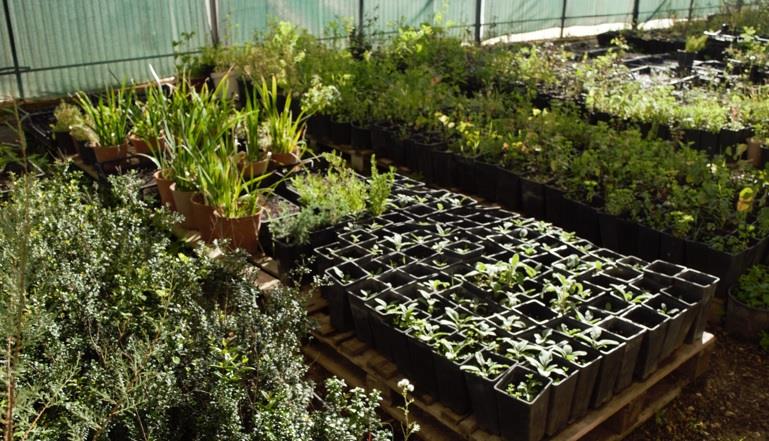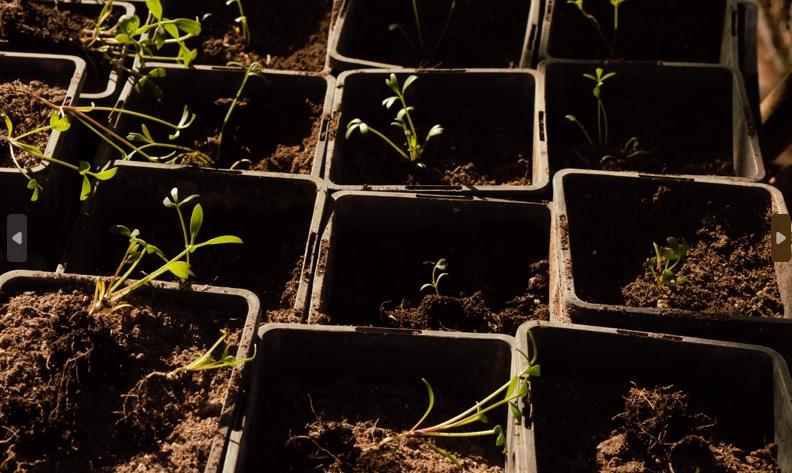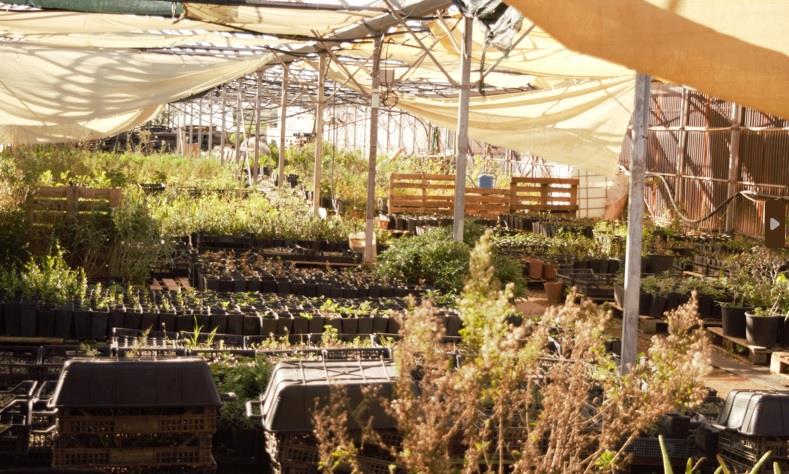“Malta is a country which is run by dinosaurs deciding for future generations, without the knowledge or will to create a better environment,” CEO of the NGO ‘ACT’ Claude Ebejer said.
Established in 2018, a group of friends who were fed up with people complaining and bickering about local issues, felt the need to seek out solutions and application. The environmental NGO, known as ACT, focuses on four different topics, being the environment, health, the arts and socioeconomics.
Volunteers Claude Ebejer, Karl “Spika” Spiteri, and Luke Bonavia are currently the three friends who volunteer at the organisation’s greenhouse in Mgarr.
Describing themselves as pioneers, ACT is one of the few environmental NGOs in Malta which propagates (breeding of plant species by natural processes from the parent stock) native flora species in the country, whilst focusing on conserving, preserving, and promoting native species, ranging from perennial flowers to bushes and trees.
“We sought to fill a vacuum, as there is a lack of understanding and awareness about our local habitats and environment. We are a part of nature, not separate from it,” Ebejer told The Malta Independent on Sunday.
“Although there are many NGOs who speak out on the environment, there are very few who grow species in a greenhouse, and do conservation,” Spiteri said.
ACT has also been active in contributing to policy making in the environment sector, whilst also focusing on implementing, getting their hands dirty and ‘learn by doing.’ After almost four years, ACT has managed to propagate more than 60 different native species, and around 35,000 trees.

Asked about their responsibilities at the greenhouse, Bonavia said that they work according to the needs and the season.
“If it’s seed collection season, we do seed collection, there’s the cuttings season, re-potting season and more,” Bonavia said.
Ebejer continued that for the first few years, ACT was more focused on policy. The organisation had a lot of influence when it came to pushing for native flora species.
“We were crucial in pushing towards the policy for Tree and Woodlands Protection regulations, with clear guidelines on how to care for the trees. This then led to the Tree Specialist License whereby people who work in embellishment projects and apply for tenders now need to be licensed in local trees and care for trees,” Ebejer said.
Ebejer said that the organisation does its best to work hand in hand with other NGOs, as it believes in collaboration, doing their best to galvanize people’s actions in the environmental field. He said that ACT was also involved in a number of strategies such as the Well-being strategy, the Single-use plastic strategy, and more.
“Through our workshops and internal lobbying, we were influential for these regulations and policies to happen. Are they being implemented? That’s another story. However, at least it’s been set in policy,” Ebejer said, adding that in the last years, they have been mainly focusing on propagation, as they arrived at a stop.
“When it comes to engagement with the government, we feel as if we are talking to a wall,” Spiteri said, saying that there is a lot of extra politics which wastes time and energy.
The organisation was asked what it thinks of the current environment in Malta, and where it is heading.
“Malta is a country which is run by dinosaurs deciding for future generations, without the knowledge or will to create a better environment,” Ebejer said.
“There is a big problem, there is no longer any habitats, and we keep taking from the little we have. Apart from that, there are many species whose specific habitats are being destroyed, meaning you can no longer find them in the wild,” Spiteri said.

“You can count on one hand the specimens you’re able to find in the wild nowadays,” he continued.
Spiteri said that while there are many NGOs working for nature and conservation, if the laws are not respected, their work is for nothing. Certain species do not exist anymore in Malta, and there is a wish for them to be re-introduced in the wild, he said.
“The gap we have between humans and nature is too large. We have become accustomed to importing everything, doing nothing in our own country,” Spiteri said.
Ebejer said that there is a tendency in Malta to speak politically, seeing things in either black or white, and each discussion is always grey.
“Development is important, otherwise we cannot move forward as a country. The issue is the gap between humans and the natural environment. If you ask a Maltese person to name five Maltese trees, they struggle. If they manage, they name fruit trees,” Ebejer said.
He said that this shows that the only appreciation Maltese people show towards nature is if they can get something from it in return. Ebejer described Maltese people’s relationship with nature as agricultural.
Is there a potential for Malta to rehabilitate itself?
“I believe that Malta can become a beacon for Mediterranean ecology. We can create quality green jobs from this sector, where as a population, we can export our knowledge and skills to other Mediterranean countries. We can become a bridge between North of Africa, and Europe, as with our knowledge in the Mediterranean we can become catalysts,” Ebejer said.
He continued that he has not given up, and what they do, they do out of their passion for the environment.

“Our problem is that humans believe that we are better than nature. We are a part of it, not something separate,” Ebejer said.
He pointed out that the biggest issue is the disregard the country has to the importance of human management, and total disregard to education in this sector.
“There is a huge problem of wasting human potential, waste of time, resources and energy which results to nothing. If we dedicate some more time to planning which compliments all aspects of life instead of the interests of certain individuals, we can move forward better,” Ebejer said.
He described entities such as the Planning Authority (PA), and the Environment and Resource Authority (ERA) as a disgrace, who go against their own vision and missions.
“ERA puts more sticks in the wheels of those who want to work for the environment, than the ones committing abuses of the rules. They blame lack of human resources, but the truth is that there is a lack of management,” Ebejer said.
Asked about their experience working with government entities Ebejer said that the situation is ‘disastrous.’
“I wish I can say, ‘no comment.’ From Plant Health Malta, Ambjent Malta, EcoGozo, the Dawwara Nursery, Greenserv, Parks Malta, Lands Authority, there is a pre-meditated fragmentation which impedes government from implementing the embellishment projects it wishes to do,” Ebejer said.
He said that government entities saw the organisation as a threat and instead of helping them they saw to it that NGOs undergo long processes of bureaucracy, meetings which lead to nowhere and unnecessary pressure.
Ebejer said that government has tried several times to put pressure and shut them down indirectly, even proposing Memorandum of Understandings (MOU) which are unachievable, then tell them that they did try collaborating with them. He said that many demands are made which are to be met within their criteria.

Government ‘bullies’ environmental NGOs with unnecessary pressure and long bureaucratic processes, he said.
“I am disappointed to say that in our encounters with government entities, there are a lot of people who do good work who work in these entities, and they themselves are choked by their superiors who are not motivated to work towards the aim of the entities they are working for,” Ebejer said.
He called it a big shame, as he said that he would still want to work with them, to continue contributing for a better country.
“I have seen more enthusiasm from ministers to implement certain things, but the government machine is stagnant. The problem is the certain dinosaurs who are in positions of power. There’s a fight for efficiency and effectiveness which is creating an opportunity for certain few individuals in the private sector,” Ebejer alleged.
“Environment Minister Miriam Dalli is doing her utmost to implement and carry out things. I believe in her, but I do not believe in Ambjent Malta, Parks Malta, in the Permanent Secretary of Environment and the people who are running things,” he said.
“The people working with Dalli in government are not ready to implement, and they create excuses, barriers so that the work is not done,” Ebejer said.
He said that the environment sector needs planning for the long term, as especially with the environment, one cannot expect to see the impact a Minister is doing in simply a year. Results are reflected years down the line.
“A lot of the ideas we gave them, they took with no problem. However, the idea is just 2% of the whole initiative, you must have a process of budgeting, planning, implementation, monitoring, maintenance, and an evaluation of what we have already done,” Ebejer said.
He said that government entities should be focusing on implementing strategies now, and it should not be left for future generations.

When it comes to funds for NGOs, Ebejer said that government gives the organisation funds for materials but do not allow them to invest in human resources.
“How can you expect us to provide consistent results if we do not have opportunities to employ and invest in those who have the energy, skills, and interest to work? We can reach for more people to help with sustainability and provide more green jobs,” he said.
He said that at this point in time, there are only ideas, but the country is lacking in people with the skills of what must be implemented.
“The theory is very flawed. There is a lack of knowledge even from people who study in this sector. The knowledge they have is poor and not practical at all. What is the point if they are teaching you techniques that are being done in the Netherlands?” Spiteri said, adding that Malta has a unique biodiverse environment different from any other country.
Ebejer said that it is almost impossible to open a business in this sector, as the schemes are non-existent, and one must invest their time now to bear the fruit years later, as nature takes time.
He said that the NGO fought for the Social Enterprise Act, which Dalli managed to push, which creates the opportunity for people to start a for-profit organisation which has social, cultural and environmental affinity.
Ebejer pointed out that it remains difficult for a start-up in this sector, as you need large capital to start. Spiteri added that it is even more difficult as knowledge on how to propagate trees in Malta is limited, and everything is grown by trial and error at ACT.
Asked about surveys showing that youths in Malta want to leave the country due to various factors, one of them being the environment, Ebejer said that rather than complaining, people must take ownership of their actions and participate, voice their concerns and engage.
“There is a lot of talk, but no action. This is a selfish mentality, the amount of youth who come volunteer here is minimal,” Ebejer said.
Bonavia said that people must create their own opportunities if they feel that there are no possibilities in Malta. The people who are working in government should be constructive in that role, Spiteri added.
Renting a greenhouse is also challenging, but in light of everything, there have been positives, Ebejer said. He said that there have been those who helped the NGO out of their own will, even if they have nothing to do with the environment.
Asked if he would like to expand the organisation, Ebejer said that they are looking to become sustainable in the next three to five years, eventually employing Bonavia on a full-time basis, and increasing staff to increase productivity.
“We would like to equip a nursery with the right climate, and we will continue to seek a place where we can create an eco-hub where we can push for a community centre. We would like to also tap into European and international funds and the European solidarity corps again so that we could bring on more volunteers to assist us and to send our own volunteers to other countries in the Mediterranean,” Ebejer said.
Bonavia said that ACT also holds workshops for everyone, including young children, where they are able to get their hands dirty and learn about flora species in the greenhouse.
Ebejer said that from all the people that came and went at the greenhouse, the trio have enjoyed what they do, and the door will always be open.
“We’ll be happy to share our knowledge and small victories with anyone who comes. This is what keeps us going, us three and our greenhouse,” Ebejer said.